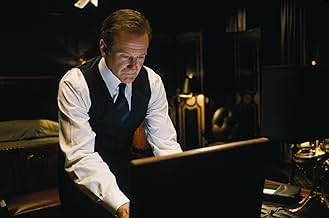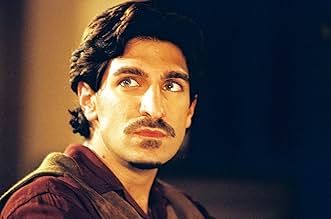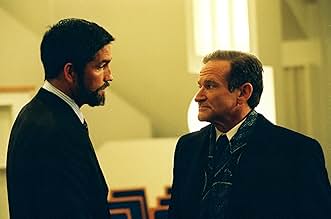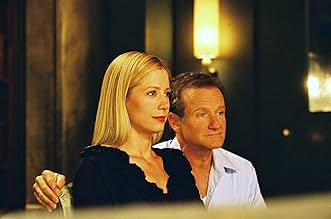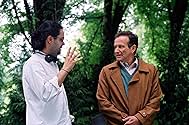IMDb-BEWERTUNG
6,1/10
35.454
IHRE BEWERTUNG
In einer Welt mit Implantaten, die Erinnerungen aufzeichnen, ist Alan Hakman ein Cutter mit der Macht, die gespeicherte Geschichte von Menschen zu bearbeiten und eine endgültige Fassung zu e... Alles lesenIn einer Welt mit Implantaten, die Erinnerungen aufzeichnen, ist Alan Hakman ein Cutter mit der Macht, die gespeicherte Geschichte von Menschen zu bearbeiten und eine endgültige Fassung zu erstellen. Seine letzte Aufgabe bringt ihn in Gefahr.In einer Welt mit Implantaten, die Erinnerungen aufzeichnen, ist Alan Hakman ein Cutter mit der Macht, die gespeicherte Geschichte von Menschen zu bearbeiten und eine endgültige Fassung zu erstellen. Seine letzte Aufgabe bringt ihn in Gefahr.
- Auszeichnungen
- 1 Gewinn & 4 Nominierungen insgesamt
Tarek Bishara
- Hasan
- (as Thom Bishops)
Empfohlene Bewertungen
I have always been a Robin Williams fan. From watching him goof around in Mrs. Doubtfire when i was a kid to seeing him actually creep me out in One Hour Photo, probably his best movie to date. So i am willing to see anything he has to offer. I got a chance to see The Final Cut for free, so i took it. The plot seemed real interesting and it was a first. Later into the movie though, the plot was getting cut more than people's memories. Williams romance with Mira Sorvino (which was gag-worthy to begin with) doesn't have any closure, and the "cutting" procedure and the whole "chip in the brain" thing didn't seem too thought out. Robin Williams is good as always and he tries his best to keep you interested, and the opening of the movie was promising. I even think with a little work that director Omar Naim can make some really quality flicks. This one, however, seems like it was cut together from a better movie. Which is a shame because it was a really cool idea. 5/10
I don't completely understand the negative reviews of this film because I thought films (except for documentaries) legitimately use the "willfull suspension of disbelief" to accomplish their goals of entertainment. Granted, not everything in this film makes perfect logical sense and could have been written just a little better (or maybe suffers the fate of all literature to film shortcomings) but I absorbed the film as a morality/ethics dilemma rather than a logical tale of facts and relationships. I do concede the ending left me a little wanting for resolution.
Good questions were touched upon in a less than preachy head slap because of the low key acting presentations. And Williams has always held my attention in any of his work to date. This one is worth watching if you're not a detail critic, though it's not as badly crafted as some would make it seem.
Good questions were touched upon in a less than preachy head slap because of the low key acting presentations. And Williams has always held my attention in any of his work to date. This one is worth watching if you're not a detail critic, though it's not as badly crafted as some would make it seem.
It's the kind of film provoking many ethical questions about life, death, privacy and so on. Omar Naim's direction gives a glimpse into possible science discoveries and paths; its strong originality consists of showing how the state of civil rights could be threatened if these futuristic odyssey came true. The whole film is based on a steady premise, very solid performances and an impressive visual style, though special effects are not as special as one could think (given this title and this plot). Robin Williams is now accustomed to playing such frightening and alluring roles; after "Insomnia", "One hour photo" and this flick "Dead Poets Society" is now a far memory.
In six words: great idea-not so great execution. In a slightly vague future, Robin Williams plays a video editor named Alan, his job is assembling 1-2 hour video portraits of deceased clients whose parent's were well off enough to have had them fitted (while still in the womb) with a "Zoe" implant. Named after the corporation that initially developed this device, the implant records (24-7) everything that happens to a person during their lifetime. It is important to the story that viewers understand that these are not memories but actual recordings. This distinction is critical to the plot as well as to one of the interesting questions posed by the film; to what extent have our actual memories been distorted by time.
The editors (called cutters) must distill down this lifetime of footage into a brief highlights video, discretely deleting scenes that would be offensive to the family of the decreased. This is not that different than the writers of obituary notices (see "Closer"). The video is shown at a special memorial service called a "rememory". To add some unnecessary complexity to the story there is a violent protest group who object to the whole concept. The basis of their objection is never adequately explained but seems to be centered on the fact that the footage is by necessity all from the person's own "point-of-view", with the protesters chanting "remember for yourself".
Of course a Cutter sees everything (mostly in fast motion) making him or her privy to a person's every secret and sin. In the film they briefly raise the most interesting question posed by this whole idea, if you knew that someone (be it man or God) would replay your entire life, to what extent would it change your behavior? In the film most (but not all) people with the implant are aware that they have it.
Knowing all this stuff makes Alan a lonely man. His philosophy: "The dead mean nothing to me, I took this job out of respect for the living", has caused him to avoid close interpersonal relationships, which might compromise the many confidences he is keeping. Within the closed community of cutters he is known as a "Sin Eater" because of his willingness to sanitize the lives of the scum of the earth, accepting clients that the other cutters reject. Williams looks even sadder and more depressed than in did in "What Dreams May Come". It is a extremely restrained performance, not especially challenging but perfectly suited to the mood of this film.
Alan gets in trouble when he takes on a project for a rich widow (Stephanie Romanov). Her husband knew a lot of corporate secrets and had been playing around with their young daughter. This "messing around with something much bigger" has a Raymond Chandler feel to it, and this fits nicely with what might be called a futuristic film noir production design.
Overall the many interesting ethical and philosophical questions raised by "The Final Cut" are more interesting than the film itself. In fact, there is so little real suspense and character identification that the viewing process is mostly an exercise in pulling yourself back from your contemplation of earlier scenes so that you can follow what is happening on the screen.
The film goes wrong by introducing a parallel story about Alan's childhood. While well handled, it fails in its purpose of explaining his adult motivations. By the end we care nothing about his character or his actions and are back to day dreaming about the many issues the film raises but does not adequately address.
Then again, what do I know? I'm only a child.
The editors (called cutters) must distill down this lifetime of footage into a brief highlights video, discretely deleting scenes that would be offensive to the family of the decreased. This is not that different than the writers of obituary notices (see "Closer"). The video is shown at a special memorial service called a "rememory". To add some unnecessary complexity to the story there is a violent protest group who object to the whole concept. The basis of their objection is never adequately explained but seems to be centered on the fact that the footage is by necessity all from the person's own "point-of-view", with the protesters chanting "remember for yourself".
Of course a Cutter sees everything (mostly in fast motion) making him or her privy to a person's every secret and sin. In the film they briefly raise the most interesting question posed by this whole idea, if you knew that someone (be it man or God) would replay your entire life, to what extent would it change your behavior? In the film most (but not all) people with the implant are aware that they have it.
Knowing all this stuff makes Alan a lonely man. His philosophy: "The dead mean nothing to me, I took this job out of respect for the living", has caused him to avoid close interpersonal relationships, which might compromise the many confidences he is keeping. Within the closed community of cutters he is known as a "Sin Eater" because of his willingness to sanitize the lives of the scum of the earth, accepting clients that the other cutters reject. Williams looks even sadder and more depressed than in did in "What Dreams May Come". It is a extremely restrained performance, not especially challenging but perfectly suited to the mood of this film.
Alan gets in trouble when he takes on a project for a rich widow (Stephanie Romanov). Her husband knew a lot of corporate secrets and had been playing around with their young daughter. This "messing around with something much bigger" has a Raymond Chandler feel to it, and this fits nicely with what might be called a futuristic film noir production design.
Overall the many interesting ethical and philosophical questions raised by "The Final Cut" are more interesting than the film itself. In fact, there is so little real suspense and character identification that the viewing process is mostly an exercise in pulling yourself back from your contemplation of earlier scenes so that you can follow what is happening on the screen.
The film goes wrong by introducing a parallel story about Alan's childhood. While well handled, it fails in its purpose of explaining his adult motivations. By the end we care nothing about his character or his actions and are back to day dreaming about the many issues the film raises but does not adequately address.
Then again, what do I know? I'm only a child.
Set in a world with memory implants, Robin Williams plays a cutter, someone with the power of final edit over people's recorded histories. His latest assignment is one that puts him in danger.
While this is an interesting science fiction universe in and of itself, it also has an interesting message on surveillance and Neo-Luddism. While the idea of having your life on film for future generations may sound pleasant (or horrible), it puts everyone in the path of a camera -- anyone who looks at you may be recording your every move.
This is an idea that is thoughtful and well-presented. Maybe they could have explored the theme more, and it might even be worth returning to this universe in a future film...
While this is an interesting science fiction universe in and of itself, it also has an interesting message on surveillance and Neo-Luddism. While the idea of having your life on film for future generations may sound pleasant (or horrible), it puts everyone in the path of a camera -- anyone who looks at you may be recording your every move.
This is an idea that is thoughtful and well-presented. Maybe they could have explored the theme more, and it might even be worth returning to this universe in a future film...
Wusstest du schon
- WissenswertesThe Zoe implant records all visual experiences in a person's life. In Greek, Zoe means "life".
- PatzerThe paper announcing Bannister's death states that he was 54 when he died. But, when Alan loads his implant for the first time, it states that there are 544,628 life hours to review. That number of hours would make him over 62 years of age.
- Soundtracks4 Seasons/Spring
(1725)
Written and Composed by Antonio Vivaldi (as Vivaldi)
Performed by Royal Philharmonic Orchestra (as The Royal Philharmonic)
Published by Extreme Music Library PLC
Courtesy of Extreme Production Music
Top-Auswahl
Melde dich zum Bewerten an und greife auf die Watchlist für personalisierte Empfehlungen zu.
- How long is The Final Cut?Powered by Alexa
Details
- Erscheinungsdatum
- Herkunftsländer
- Offizieller Standort
- Sprache
- Auch bekannt als
- The final Cut - Dein Tod ist erst der Anfang
- Drehorte
- Produktionsfirmen
- Weitere beteiligte Unternehmen bei IMDbPro anzeigen
Box Office
- Bruttoertrag in den USA und Kanada
- 551.281 $
- Eröffnungswochenende in den USA und in Kanada
- 226.296 $
- 17. Okt. 2004
- Weltweiter Bruttoertrag
- 3.222.439 $
- Laufzeit
- 1 Std. 35 Min.(95 min)
- Farbe
- Sound-Mix
- Seitenverhältnis
- 2.35 : 1
Zu dieser Seite beitragen
Bearbeitung vorschlagen oder fehlenden Inhalt hinzufügen


